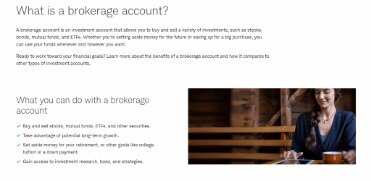Brokerage Accounts

This is an order in the millions of dollars so Amy feels more comfortable having a broker execute the trade directly. Under the Investment Advisers Act of 1940, RIAs are held to a strict fiduciary standard to always act in the best interest of the client, while providing full disclosure of their fees. Brokers register with the Financial Industry Regulatory Authority (FINRA), the broker-dealers’ self-regulatory body. In serving their clients, brokers are held to a standard of conduct based on the “suitability rule,” which requires there be reasonable grounds for recommending a specific product or investment.
Usually discount brokers ask for a small commission on each sale and purchase and some ask for annual fees, though this is less common. Some of these brokers will offer their clients personalised advice for an additional fee. Because of the added services they offer, most traditional full-service brokerages charge a fee, commission or both. For regular stock orders, you might be charged up to $20 per trade, though many brokers have adopted a model where you pay an all-inclusive annual fee for all services. They not only execute trades for you, but also provide a range of other services, which might include tax planning, research, investment advice, and estate and retirement planning.

In this case, the share-dealing platform is essentially Michael’s broker. Soon, Joanna receives an unexpected bonus at work, which she wants to invest too as a lump sum payment. After receiving advice from her broker, Joanna decides what works best for her, and makes a market order. To understand what brokers do, it helps to have some quick background about the stock market.
Aristocrat Leisure Limited (ASX :ALL)
A trusted contact is simply someone who can help your financial firm help you, if needed. We suggest a trusted contact for anyone who has an investment account. The value of shares and ETFs bought through a share dealing account can fall as well as rise, which could mean getting back less than you originally put in. Many or all of the products featured here are from our partners who compensate us. This influences which products we write about and where and how the product appears on a page.
Brokers make a decent salary, working through the day ensuring smooth transactions between their clients and the exchanges. Brokers can physically present trades but more often than not, brokers monitor trades from their computers and are only needed to intervene in the case of an exceptionally large or unique trade. Some full-service brokerages offer a lower-cost discount brokerage option as well. These companies also offer stock quotes, research on economic conditions, and market analysis.
More Questions About Your Investment Accounts?
A full-service brokerage will typically have a dedicated broker who can meet with you in person and provide personalized advice based on your specific circumstances. There are different kinds of brokerage services offered by different types of brokerage firms. The most common types of firms include full-service firms, discount firms, and online firms. A broker is an intermediary between those who want to make trades and invest and the exchange in which those trades are processed. You need a broker because stock exchanges require that those who execute trades on the exchange be licensed. Another reason is a broker ensures a smooth trading experience between an investor and an exchange and, as is the case with discount brokers, usually won’t charge a commission for normal trades.
Furthermore, they know what types of enterprises each lender focuses on. The most common reason for declining the transfer of an account is the new firm’s credit policies. For example, the new firm may decide not to accept the account due to the quality of securities supporting a margin loan or because the account does not meet its minimum equity requirements. Your firm is required to provide written disclosure of the terms of the loan, including the rate of interest and the method for computing interest.
Brokers work closely with clients to ensure they choose investments that meet their needs. A brokerage firm is essentially a company that connects buyers and sellers. It simply provides a service to the financial market, which generates its primary source of income. For regular stock orders, full-service brokers may charge up to $10 to $20 per trade. However, many are switching to a wrap-fee business model in which all services, including stock trades, are covered by an all-inclusive annual fee.
For example, firms can raise their maintenance margin requirements for specific volatile stocks to ensure there are sufficient funds in their customers’ accounts to cover large price swings. The terms under which firms can extend credit for securities transactions are governed by federal regulation and by the rules of FINRA and the securities exchanges. Discount brokerages
offer fewer services than full-service brokerages and charge lower commissions. They are a good choice for investors who are comfortable making their own investment decisions. In addition, the advent of online trading has made it possible for investors to trade directly with each other without going through a broker.
Real estate brokers in the United States are licensed by each state, not by the federal government. Each state has its own laws defining the types of relationships that can exist between clients and brokers, and the duties of brokers to clients and members of the public. The introduction of the first discount brokerage is often attributed to Charles Schwab Corp., which launched its first website in 1995. They represent both retail and institutional clients either through a stock exchange or over the counter. A broker also has the resources and tools to reach the widest possible base of buyers. They screen these potential purchasers for revenue that would support the potential acquisition.
A financial instrument is any asset or bundle of assets that can be traded. When you open a new, eligible Fidelity account brokerage firm definition with $50 or more. Your website access and usage is governed by the applicable Terms of Use & Privacy Policy.
Full-Service Brokerage
Adam received his master’s in economics from The New School for Social Research and his Ph.D. from the University of Wisconsin-Madison in sociology. He is a CFA charterholder as well as holding FINRA Series 7, 55 & 63 licenses. He currently researches and teaches economic sociology and the social studies of finance at the Hebrew University in Jerusalem. In fact, virtually every citizen in the advanced economies can afford to invest in the stock market today.
Many brokerages hire individual brokers as a way to pool resources and offer the best service. In addition, many financial services companies also have brokerage houses as part of their broader services. An online brokerage firm is a brokerage firm that provides its services through the internet. There is the type that doesn’t have any physical offices at all. And then there are those that operate under a full-service or discount firm.
Traditionally, brokers communicated with clients via a phone or face to face, and offered personalised investment strategies and advice. They charged high commissions and were exclusive to high net-worth individuals. The broker’s role in the financial system is as a facilitator for buyers and sellers, creating efficiency and liquidity in the markets. They are essentially responsible for executing client market orders. Estate planning, money management, financial counselling, and tax counselling are among the services and products offered by full-service brokerages, often known as traditional brokerages. Some brokerages charge higher commissions for trades, while others charge monthly or annual fees.
Independent agents, also known as individual agents, work with multiple insurance companies rather than being tied to a single company. Indie agents have contracts with these companies and are approved to offer their products. A discount brokerage is a stripped-down, bare-bones version of a full-service brokerage that usually doesn’t do much beyond executing trades. This might mean you’re not getting a dedicated team of professionals helping you understand how you can grow your wealth.
- They are a good choice for investors who are comfortable making their own investment decisions.
- The commissions charged by discount brokerage firms are cheaper than those of full-service brokerage firms.
- Usually discount brokers ask for a small commission on each sale and purchase and some ask for annual fees, though this is less common.
- Where insurance is concerned, a broker is also the term for one who sells insurance.
- Companies subsequently use the information to target advertising and marketing towards specific groups.
- Indie agents have contracts with these companies and are approved to offer their products.
These types of programs offer different benefits and risks, including different interest rates and insurance coverage. Be sure to find out from your brokerage firm what your choices are and what fees, if any, you have to pay. Yet the emergence of the digital age gave rise to online brokers, many of which are execution only. These are digital investing and trading platforms that allow clients to place trades in a few clicks, and often charge less commissions, yet may not offer specialised investment advice.

The online broker who offers free stock trades receives fees for other services, plus fees from the exchanges. The portion of the purchase price that the customer must deposit is called margin and is the customer’s initial equity in the account. The loan from the firm is secured by the securities that are purchased by the customer. A customer may also enter into a short sale through a margin account, which involves the customer borrowing stock from a firm in order to sell it, hoping that the price will decline. Customers generally use margin to leverage their investments and increase their purchasing power.
What Is A Real Estate Broker? – Bankrate.com
What Is A Real Estate Broker?.
Posted: Mon, 22 Aug 2022 07:00:00 GMT [source]
A brokerage firm earns a commission from insurers and pay their own expenses for office space, staff, software and other costs involved in operating a business. A brokerage firm is mostly composed of brokers, people who buy and sell goods on behalf of others. These brokers usually specialize in securities, financial instruments like stocks or bonds. Clients go to these firms either to buy or sell these instruments. For every completed transaction, the firm earns a commission, which serves as its source of income. A brokerage firm can also give professional advice about financial matters for a fee.
To conclude, investment brokers are professionals who buy and sell financial instruments on behalf of their clients. They can be classified as stock brokers, commodity brokers, forex brokers, and others, depending on the instrument they provide. The necessity for prime brokerage arose from the growth in hedge funds. This rapid rise https://trading-market.org/ created a need for an intermediary, who would cater for the complex and difficult operations that are necessary for hedge fund management. Prime brokers cover the specific requirements that arise from large portfolios and certain brokers offer a more specialised service to their clients, depending on their needs and requirements.
Investors should further consider the extent of control they want over their investments. Investors with little financial experience tend to give the firm full autonomy over their investment capital, whereas experienced investors often prefer to manage their funds. As well as executing client orders, brokers may provide investors with research, investment plans, and market intelligence. They may also cross-sell other financial products and services their brokerage firm offers, such as access to a private client offering that provides tailored solutions to high net worth clients. In the past, only the wealthy could afford a broker and access the stock market. Online brokering triggered an explosion of discount brokers, which allow investors to trade at a lower cost, but without personalized advice.
A brokerage company is a financial institution that assists in buying and selling securities. Brokerage firms are distinguished from traditional banks by the way they allow customers to buy and sell securities. These days, many people open a brokerage account with online brokers rather than working with a person. Often called discount brokers, online brokers are typically less expensive and allow you to buy or sell stocks and other investments directly through their websites or trading platforms. Many online brokers now charge no commission to buy or sell stocks and other investments. A brokerage is a company that provides services to allow individuals and businesses to trade securities, commodities, and other financial products.
That is impossible in a market that has a huge number of participants making transactions at split-second intervals. The name “cash account” causes confusion for some investors who think only cash can be held in the account. But cash accounts can hold a wide range of stocks, bonds, mutual and exchange-traded funds, and other securities—as well as cash.
What is the role of a brokerage firm?
A brokerage firm acts as an intermediary who makes matches between buyers and sellers of stocks, bonds, and other financial assets. Investment managers are individuals or organizations who handle activities related to financial planning, investing, and managing a portfolio for their clients.
Many financial services organisations also offer brokerage houses as part of their broader offerings. As the intermediary between customers (insureds) and sellers (insurance companies), brokers play an important role. Some brokers may also conduct extra risk management services, helping them with recommendations on how to control risk outside of what insurance covers. These are important value-added services that can help create a better customer experience and generate additional revenue for the brokerage firm.
SEC Adopts Amendments to Form PF – Lexology
SEC Adopts Amendments to Form PF.
Posted: Thu, 11 May 2023 08:39:04 GMT [source]
They also determine the properties’ market value and advise their clients regarding offers and other related matters. Additionally, the Federal Reserve Board’s Regulation T governs how you use your cash account to purchase securities. Your brokerage firm must comply with Regulation T and can take action, such as putting restrictions on your ability to trade, if it determines that you incur a Regulation T violation. Brokerage firms have the right to set their own maintenance margin requirements—often called “house” requirements—as long as they’re more stringent than the margin requirements under FINRA rules. These enhanced requirements can apply broadly or to particular stocks.
The draw of robo-advisors is not only the automation but also the low starting account balances and costs. In many situations, robo-advisors charge no commissions, have no annual fee and can begin with as little as a few dollars. Brokerage firms come in all sizes, from one- or two-person offices to huge firms with offices around the world. They are sometimes differentiated as full-service or discount firms, based on pricing structure and client relationships. Operations on the exchange market are difficult for outsiders and require a certain number of special approvals and permissions to finalize transactions.
What is an example of a brokerage firm?
They are often referred to as the ‘big four brokerages.’ Each of these firms—Charles Schwab, Fidelity Investments, E*TRADE, and TD Ameritrade—comprise the top in terms of customers and assets. This short article analyzes the products, services, and fee structure of each brokerage.
